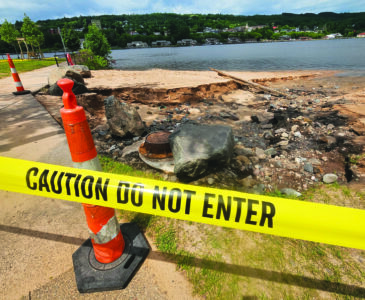Inaugural UP Accessibility Summit held in Houghton
HOUGHTON — Advocates and people with disabilities from throughout the Midwest met this week to discuss ways to remove barriers to mobility throughout the Upper Peninsula.
The inaugural Upper Peninsula Accessibility Summit took place at the Rozsa Center Thursday and Friday. It was put on by the Accessible Keweenaw Initiative, a coalition of community organizations and subject matter experts.
Last year, they worked with the Superior Alliance for Independent Living to assess 20 sites around the Keweenaw, such as Dee Stadium and the Estivant Pines trailhead.
“After working with them, we realized just how many people were hungry for getting together and learning about how to make their space more inclusive,” said event coordinator Rachael Pressley. In response, AKI sought out a grant from the Keweenaw Community Foundation’s Joe Freed Empowerment Fund for hosting this week’s summit.
The summit included panels with disabled people about their lived experiences, building standards, universal design or living with autism. Friday, attendees heard about accessible travel and life in the Upper Peninsula as a disabled person. Friday’s keynote speaker was Robin Jones, director of the Great Lakes Americans with Disabilities Act Center in Chicago.
“We want to get local businesses, local units of government and recreation site managers and students just excited and inspired about accessibility and to know where the experts and resources are in their community that they can reach out to,” Pressley said.
During an early-morning panel Friday, several people with disabilities talked about their experience navigating the workplace, schools and other areas.
Duncan Wyeth, an educator and advocate who helped moderate the panel, found throughout his life the biggest barriers were not physical, but attitudinal. He was born with cerebral palsy, which has led to a range of issues affecting his mobility and speech.
“Because of that speech pattern, on multiple occasions, I’ve encountered the perception that if you have slow speech, or not-really-intelligible-at-times speech, therefore you must also have an intellectual or cognitive disability,” he said.
When he was diagnosed in 1947, the doctors gave his parents a prognosis: Your son will never walk, he will have limited intelligence, and he will be dead by 40. Their advice: put him in an institution and go have another child.
His parents “accepted the diagnosis, they rejected the prognosis,” Wyeth said, although he did later get a sister.
“The first lesson I learned in life was ‘Choose your parents well,’ because they taught me to be the advocate I am today,” he said.
At the end of the summit, AKI also presented five awards honoring people and groups for their achievements.
Pressley hadn’t been sure how many people would come. For an all-day event at the end of September, the organizers had estimated about 50.
“We thought we would brush up against more schedules, but we had over 100 people register,” she said.
The planning committee representing 10 organizations has been working together for the past year to make the event happen, Pressley said.
Pressley said the hope is for it to become an annual or semi-annual event.
“So many people have been contacting us this week saying ‘How can I get more involved? I want to be part of this. These are the different sessions that you could do next year,'” she said. “And Michigan Tech is very supportive of this event, and has been incredible about, ‘How can we do this again next year and make it even better and really nice?'”




